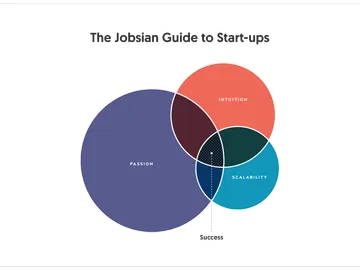How to Differentiate Yourself in a Saturated Market, Using Steve Jobs Quotes

Natalie Reich, Former Brand Strategist
Article Category:
Posted on
Turns out, the guy was onto something. Real-life lessons learned by startup founders map to the wisdom of Mr. Jobs.
Starting a company is tough. Figuring out what to build, how to build it, and how to pay for the whole thing takes tremendous energy and conviction. And the kicker? These days, nearly every idea for a product has already been thought of by someone else. But what if you have an idea that’s better than the others? How can you convince potential backers, customers, and yourself that it’s worth the effort? We asked real-life startup founders how they differentiate themselves in a crowded marketplace, both to investors and the public. As it turns out, their lessons learned, as well as the advice they give to others, map closely to the sage wisdom of the quintessential startup founder, Steve Jobs.
Jobsian Pearl of Wisdom #1
“You've got to start with the customer experience and work back toward the technology - not the other way around.”
Understand your user and their challenges. This process becomes even easier if you identify a problem you’ve encountered yourself (you’re a user, too!) and design a solution for it. Hussein Fazal of SnapTravel employed this method when designing a tool to book travel via SMS, Facebook Messenger, and Slack. “We believe that booking travel is an unpleasant experience. While commerce has moved primarily to mobile, most hotel bookings are still made on desktop. The best way to move travel commerce to mobile, is to use messaging - as this is the most natural interface.” He adds that it’s important to “observe user behavior as opposed to trying to assume what people want.”
Matthew Cooper, founder of intelligent loan payment automation platform EarnUp, has similar advice with a philosophical bent: “Go out into the world. Go into the homes and workplaces and quiet places of real people with real challenges. Watch and listen. There we will learn what the actual challenges are we as founders can help solve.”
In a more general sense, your knowledge as a user can extend beyond identifying problems. Alex Bilmes of data visualization platform Reflect notes that a unique point of view is valuable in itself: “I would recommend that founders pull from their personal experiences, since it’s the one thing they have that nobody else does.”
Jobsian Pearl of Wisdom #2
“You’ve got to have a problem that you want to solve; a wrong that you want to right.”
In the process of looking for a solution to a problem you (or others) have experienced, you might find yourself stumbling on an unaddressed need in the market. This is an opportunity not just to kill two problems with one stone, but to have a solid foundation for claiming your product’s value to prospective investors or customers.
The ease of identifying a problem, however, doesn’t necessarily indicate that the solution will also be easy. Sometimes getting a truly useful product up and running requires a combination of resource-light and resource-intensive features. Snehal Shinde of personal travel concierge app Mezi offers some tips for those considering a product with AI: “My advice to founders would be to focus on building a solid core technology that can scale with users, and not go the easy route of adding human experts too quickly, since that won’t scale in long run.”
Another important tip to keep in mind when taking on something as potentially all-consuming as a new business is not biting off more than you can chew. Dmitriy Rokhfeld of industrial equipment e-commerce site Machinio advises that founders should “focus on a single problem and solve that better than anyone else. Too often young companies attempt to disrupt new industries by solving every pain point and every inefficiency from the start.”

Jobsian Pearl of Wisdom #3
“Sometimes when you innovate, you make mistakes. It is best to admit them quickly, and get on with improving your other innovations.”
Iterating and pivoting are essential parts of the product-building experience. Steve Jobs himself was the master of the pivot, evolving his opinions on what Apple customers wanted and needed over time and having those evolutions reflected in new products.
Alex Strunkin and Derek Richardson of IoT startup Deako explained to me that they actually started their company with a theory of what they wanted to make, then pivoted the company a number of times based on a combination of listening to their users and watching the market. This continual research is imperative, as Alex noted, “you assume someone’s already doing [what you want to do], but when you actually take the time to look at the customer segment, you’ll see who’s really addressing it and who isn’t.”
Madeline Fraser of interior design app Hutch confirmed that being flexible in tweaking your business model is crucial in a fast-moving industry. “When we started our previous design company, we quickly learned the home furnishing space was missing a mobile component to assist our on-the-go generation in a way that's personalized and affordable. Knowing the space was in need of disruption, we pivoted our business model to focus on a mobile platform.” She added, “our advice would be to trust your instincts,” which brings us to our final pearl...
Jobsian Pearl of Wisdom #4
“Your work is going to fill a large part of your life, and the only way to be truly satisfied is to do what you believe is great work. And the only way to do great work is to love what you do. If you haven't found it yet, keep looking. Don't settle. As with all matters of the heart, you'll know when you find it.”
Having passion, instinct, and some sort of personal connection to the problem you’re trying to solve is key to creating something that will resonate with others. On this point, Jobs also said without passion for your work, “you won’t have the perseverance to see it through.” This is especially salient when you find yourself toiling away for weeks (or months, or years) on end building a new business and trying to gain a foothold in a crowded market.
Passion isn’t a solely introspective component to entrepreneurship, either. The practical application of your passion as a founder has a ripple effect on all facets of your business. Michael Wayne of lifestyle content startup Kin Community explains: “Focusing on your passion and finding a universal purpose are key to building a strong company foundation. In addition, defining and articulating what values are important to you will help shape and guide your company, your vision, the types of employees you hire and the partners you work with.”
Adam Zbar of food delivery startup Sun Basket expands on this point by advising other founders to consider the larger effect of their work, and “focus on building a business that you are passionate about, believe can have a major impact on the world (in a positive way), and which has a strong, scalable business model.” Seeing a larger impact of your work, even if it’s only theoretical in the beginning, can serve as powerful positive reinforcement during tough times.
Lastly, strength of passion and strength of vision go hand-in-hand when navigating the world of startups. This conviction is contagious, and sends a compelling message when communicating the idea for your business to family and friends, potential investors, and prospective customers. As Brad Heller of Reflect astutely notes, “I think it's important to have a strong vision. If you have a hard time differentiating your vision from someone else's product, then that probably means your vision is indeed not unique!”
Keeping your users and the problems they need solved as a central focus, while maintaining the flexibility to adapt to changes, and always keeping in mind the passion that drove you to come up with the idea in the first place, will go a long way toward setting you up for success in the startup world. That said, it’s also always a good idea to seek out advice one-on-one from experienced entrepreneurs who are interested in sharing their knowledge. Regardless of the niche you might hope to address with a new company, heeding the advice of others who have been in your shoes can serve to make your life a lot easier. Good luck!